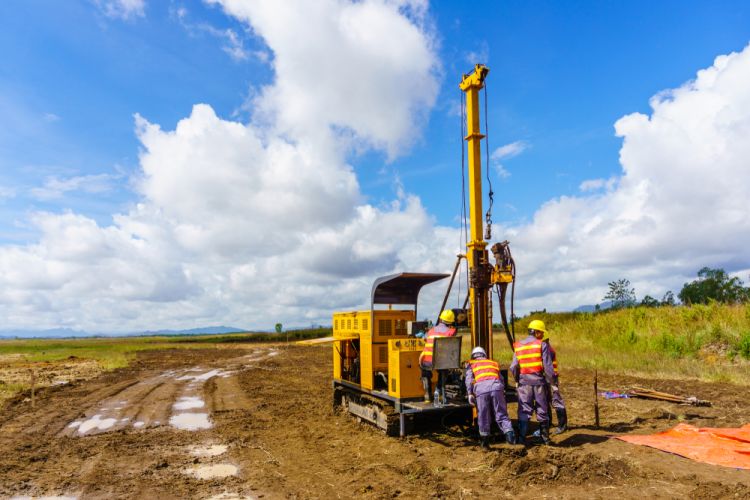More About Specialized Geotechnical Engineering Solutions
Table of ContentsSpecialized Geotechnical Engineering Solutions Things To Know Before You Get This3 Easy Facts About Specialized Geotechnical Engineering Solutions ShownIndicators on Specialized Geotechnical Engineering Solutions You Need To KnowThe Ultimate Guide To Specialized Geotechnical Engineering Solutions
They perform site investigations, gather examples, carry out research laboratory examinations, and examine information to review the suitability of the ground for construction tasks. Based on their findings, geotechnical designers give recommendations for structure style, incline stability, keeping frameworks, and reduction of geotechnical risks. They collaborate with various other specialists, such as engineers, architectural designers, and construction groups, to ensure that geotechnical factors to consider are incorporated into the overall job style and application.
Structure Design: Geotechnical designers play an important function in creating structures that can securely support the designated framework. They assess the dirt conditions and load needs to identify the ideal foundation kind, such as superficial structures (e.g., grounds), deep structures (e.g., heaps), or specialized strategies like soil enhancement. They consider aspects such as settlement limitations, birthing capability, and soil-structure interaction to create optimal foundation layouts.
Specialized Geotechnical Engineering Solutions for Beginners
Here are some kinds of geotechnical designers: Structure Engineer: Structure engineers concentrate on making and assessing structures for frameworks - Specialized Geotechnical Engineering Solutions. They analyze the soil conditions, tons needs, and site attributes to figure out the most suitable foundation type and design, such as shallow foundations, deep structures, or specialized techniques like stack foundations
They execute field screening, gather samples, and examine the gathered data to characterize the dirt properties, geologic formations, and groundwater problems at a website. Geotechnical Instrumentation Designer: Geotechnical instrumentation engineers concentrate on surveillance and measuring the habits of dirt, rock, and structures. They install and preserve instrumentation systems that keep an eye on factors such as dirt settlement, groundwater levels, incline motions, and structural displacements to evaluate performance and supply early warnings of potential problems.
In the office environment, geotechnical designers make use of specialized software application tools to perform computations, develop layouts, and examine data. Specialized Geotechnical Engineering Solutions. They prepare records, evaluation project requirements, communicate with customers and staff member, and coordinate project tasks. The workplace setting provides a favorable environment for research study, analysis, and collaboration with other professionals associated with the project
They regularly check out project websites to carry out website examinations, assess geotechnical problems, and collect data for evaluation. These check outs entail taking a trip to various places, occasionally in remote or difficult surfaces. Geotechnical designers might execute dirt tasting, conduct tests, and display building tasks to make certain that the geotechnical facets of the project are being implemented properly.
Specialized Geotechnical Engineering Solutions for Dummies
Geotechnical designers likewise operate in specialized geotechnical research laboratories. In these facilities, they perform experiments, perform examinations on dirt and rock samples, and assess the design properties of the materials. Geotechnical laboratory designers work thoroughly in these environments, dealing with screening tools, operating tools, and taping data. They work together with various other laboratory personnel to guarantee accurate and reliable testing results.
Preserving Wall surfaces: Creating wall surfaces that hold back soil to stop landslides and offer stability on sloped terrains. Embankments and Earthworks: Creating embankments for roadways, railways, and dams to guarantee they stay steady under tension. The mining industry relies greatly on geotechnical design to make sure the security and longevity of its operations.
With this websites in mind, we have developed our program to prepare students for success. Geotechnical designers are included in all stages of the design of frameworks, from concept to construction. Their job is important in the design and planning procedure as they examine the integrity of soil, clay, silt, sand, and rock, prior to building and construction beginning.
The Specialized Geotechnical Engineering Solutions Statements
This is complied with by a ground investigation based upon the findings of the desk research study and involves trial pitting and sampling to reveal any type of prospective concerns. Geotechnical engineers function within multidisciplinary groups, supported by intermediate and junior engineers as well as by CAD technicians. As a senior learn this here now geotechnical designer on a hydro plant task, jobs may consist of joining technical evaluations (e.g., peer testimonials), tailings clog examinations, dam safety and security reviews, and various other studies associated to the layout and construction of mine waste centers.
While some experts are experts entirely in geotechnics, others may function under titles like engineering geologist or ground designer within comparable capabilities. As a geotechnical designer, you'll require to: develop and keep relationships with customers and various other experts included in the website, throughout each projectmaintain safety and security criteria on site be conscious of price ramifications when you make recommendationsstudy geological maps and aerial pictures from a series of resources and from various time periodsexamine my blog building and construction plans to see just how feasible they are based on your understanding of the siteinvestigate dangers or geological risks for the sitesearch for environmentally sensitive features, such as garbage dump begin to establish factual and expository ground modelsplan field investigationsdrill and analyse samples of bedrock, dirt, groundwater and extra materials monitor other professionals on sitesolve technical problems as they arise, such as unforeseen structures at drill sitesmonitor conditions throughout and after construction to see to it frameworks are secure in the short and long termadd information accumulated on website to your first researchcreate geotechnical estimations, drawings, and two or three-dimensional computer system versions interpreting the datamake suggestions regarding the recommended use of the site.
There are great deals of opportunities to satisfy new people, as you'll work with a series of professionals at every site. The job can be stressful as you may be accountable for the security of others while on website. There is likewise a high level of financial obligation, as the referrals you make can have severe expense ramifications.
